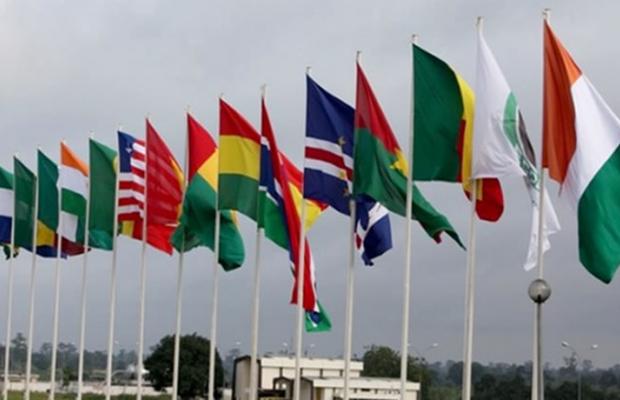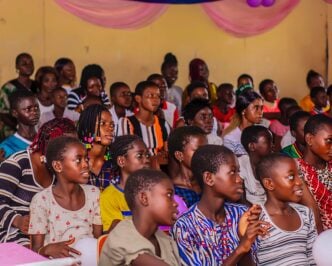ECOWAS flags
Fifty years ago, the founding vision of ECOWAS was to unite the diverse peoples and economies of West Africa under a shared agenda of economic cooperation, peace, and prosperity. Today, as the region commemorates five decades of progress, that vision remains more relevant than ever — but the tools for achieving it have dramatically evolved. The world today is defined by digital transformation, data flows, and innovation, while technology has progressed as a strategic catalyst for deepening regional integration. It offers West African nations a chance to accelerate trade and cross-border collaboration, while addressing shared challenges such as youth unemployment, infrastructure gaps, and governance inefficiencies.
As ECOWAS celebrates its golden jubilee, the region finds itself at a crossroads: the path ahead will require more than political commitment — it will demand the creative use of digital infrastructure, harmonised tech policy, and the empowerment of a new generation of innovators. The next 50 years of West African unity may well be defined not just by treaties or trade zones, but by code, connectivity, and collaboration across borders.
A Half Century of Progress
Established in 1975, the Economic Community of West African States (ECOWAS) was founded on an ambitious yet unifying vision: to create a prosperous and self-sustaining region through economic integration and shared development. What began as a collective agreement between 15 diverse nations has matured into one of Africa’s most influential regional blocs, facilitating not just the movement of goods, capital, and people, but also the exchange of ideas, culture, and diplomatic cooperation. Over the decades, ECOWAS has played a decisive role in promoting peace and security—deploying peacekeeping forces in crisis zones, mediating in political transitions, and upholding democratic values. Its trade liberalisation scheme and customs union initiatives have laid the foundation for regional commerce, while frameworks for free movement, like the ECOWAS passport, have nurtured a sense of Pan-African mobility. However, as the global economy shifts towards digital infrastructure, artificial intelligence, and borderless data ecosystems, the region faces a pivotal moment. The future of West African integration now hinges not only on physical infrastructure and policy harmonisation, but on its ability to harness digital tools for inclusive growth. To remain competitive and resilient in the 21st century, ECOWAS must reimagine integration through the lens of technology—leveraging platforms that enable seamless digital trade, interoperable financial services, e-governance, and a knowledge-driven economy that empowers its vast and youthful population.
Advertisement
Digital Bridges Beyond Borders
In a region as diverse and dynamic as West Africa, technology offers a uniquely powerful tool to bridge the divides that geography, language, and political history often reinforce. A digitally integrated ECOWAS holds the promise of unlocking unprecedented levels of connectivity and cooperation—transforming the way people, businesses, and governments interact across borders. By establishing harmonised financial technology (fintech) ecosystems, ECOWAS can empower entrepreneurs and consumers to transact seamlessly, regardless of national boundaries. Interoperable mobile platforms and regionally recognised digital identification systems would eliminate many of the bureaucratic hurdles that currently frustrate intra-regional commerce and mobility, creating a more fluid and efficient economic landscape.
Moreover, digital infrastructure can transform trade facilitation. Advanced customs management systems, electronic cargo tracking, and real-time secure data sharing between ports and customs offices can dramatically lower transit times, eliminate fraud, and boost revenue collection. Initiatives like ECOWAS’s e-Tariff and Trade Information Portal demonstrate what’s possible when digital tools are applied to longstanding challenges—but these tools must be adopted uniformly across member states, embedded into national policy, and supported by strong digital governance frameworks. The urgency and investment that have traditionally been reserved for roads, railways, and ports must now be extended to data highways, cloud infrastructure, and cross-border digital standards. A region that is digitally connected can be economically integrated, socially cohesive, and politically aligned in ways that were unimaginable just a few decades ago. This is the promise of digital bridges: not just to connect systems, but to unify societies.
Advertisement
Fintech as a Force for Integration
West Africa is rapidly emerging as one of the world’s most vibrant fintech regions, with homegrown startups transforming how people save, spend, borrow, and invest. Countries like Nigeria, Ghana, and Côte d’Ivoire have become regional innovation hubs, producing financial technology companies that are solving local challenges and scaling across borders. Nigerian firms such as Flutterwave, Currex, and Moniepoint have built digital payment infrastructures that serve millions, offering fast, secure, and affordable alternatives to traditional banking. Flutterwave, for example, now supports payments in over 30 African countries, and has partnered with global companies like Uber and Booking.com—demonstrating the capacity of West African fintechs to operate at scale.
This momentum holds transformative potential for ECOWAS. If member states harmonise their fintech regulations and support interoperability between mobile money platforms, they can create a seamless financial ecosystem across the region. Imagine a market trader in Burkina Faso using an app like Wave or MTN MoMo to instantly pay a supplier in Ghana, or a young entrepreneur in Sierra Leone receiving remittance funding through a Nigerian fintech’s cross-border API. Farmers in Niger could access weather-indexed insurance or microloans via mobile apps designed in Lagos, while students in Liberia might use digital wallets to pay for online courses hosted in Senegal—all in real time, without costly currency conversions or paperwork.
This is not a distant dream. Mobile penetration in West Africa is among the highest in sub-Saharan Africa, and digital wallets are already widely used in several ECOWAS countries. What remains is to bridge policy gaps, standardise digital identity verification, and invest in interoperable infrastructure. By doing so, fintech can become more than just a convenience—it can become the engine of regional integration, bringing financial inclusion to the underserved, stimulating cross-border entrepreneurship, and weaving a tighter web of economic interdependence across West Africa.
Advertisement
Towards a Common Digital Market
The ECOWAS Digital Economy Strategy charts an ambitious but necessary course: the creation of a unified digital market that seamlessly connects all 15 member states. This vision is rooted in the recognition that digital fragmentation—where each country operates under different rules, platforms, and technical standards—hinders innovation, drives up costs, and limits the ability of entrepreneurs to scale across borders. A common digital market would break down these barriers, allowing startups, service providers, and digital consumers to operate with the same ease as within a single country.
Shared digital regulations are central to this effort. By harmonising laws around data protection, cybersecurity, and intellectual property rights, ECOWAS can build trust and legal clarity for businesses and users alike. For instance, a tech startup in Ghana that develops an edtech platform should be able to confidently expand to Sierra Leone, Côte d’Ivoire, and Benin without having to navigate vastly different privacy laws or content restrictions. This is particularly important for sectors like health tech and fintech, where secure data handling and regulatory compliance are critical. The African Union’s Malabo Convention on Cybersecurity and Personal Data Protection provides a strong framework that ECOWAS can adopt and adapt regionally.
Use Case: Cross-Border Data Hosting
Advertisement
Imagine a Nigerian logistics tech company serving clients in Senegal, Burkina Faso, and Togo. Without unified cloud infrastructure and data transfer rules, it may have to host user data in multiple countries to comply with local requirements — a costly and technically inefficient approach. But with a common framework and regional data centres, that same company could securely host data in one location and serve the entire ECOWAS market.
Infrastructure is the other pillar of integration. The expansion of fibre-optic backbones across West Africa—especially landlocked countries like Mali and Niger—will ensure high-speed connectivity is not limited to coastal urban centres. Projects like the West Africa Regional Communications Infrastructure Program (WARCIP) have laid groundwork for this, but must be complemented with investment in local data centres, IXPs (Internet Exchange Points), and cross-border cloud services. This reduces reliance on expensive international bandwidth and improves latency for digital services.
Advertisement
Use Case: Regional Streaming Platforms or eLearning Hubs
A regional digital market would allow platforms like irokotv or uLesson to deliver content from data centres hosted in Ghana but accessed efficiently in The Gambia or Guinea-Bissau. Lower latency and bandwidth costs mean better user experience and greater uptake, boosting revenue and educational outcomes.
Advertisement
Moreover, such infrastructure helps ECOWAS withstand global supply chain shocks, like those seen during the COVID-19 pandemic. Localised cloud storage and regional supply chains for digital equipment can reduce dependency on external actors, creating greater digital sovereignty.
Ultimately, a common digital market will do more than just connect businesses—it will connect people. It will allow a freelancer in Sierra Leone to work for a company in Togo, a health provider in Benin to access AI diagnostic tools hosted in Nigeria, and a student in Cape Verde to enrol in a cloud-based vocational course offered from Ghana. For ECOWAS, this is not just about economic integration — it is about building a truly digital community.
Advertisement
Nigeria’s Role: Leading from the Front
As the beating heart of West Africa (both demographically and economically) Nigeria holds a unique responsibility and opportunity to drive the digital transformation of ECOWAS. With over 220 million people, a thriving tech ecosystem, and the largest pool of digital talent in the region, Nigeria will not simply be a participant in ECOWAS’s digital future; it is its natural leader. From policy to platforms, from infrastructure to innovation, Nigeria’s leadership can catalyse a more integrated and resilient digital West Africa.
Through key institutions like the National Information Technology Development Agency (NITDA), Nigerian Communications Commission (NCC), and the Central Bank of Nigeria (CBN), the country is well-positioned to lead regulatory harmonisation across the region. For instance, NITDA’s ongoing work on Nigeria’s Data Protection Act and the country’s Open Banking framework can serve as templates for regional digital policy alignment. If Nigeria pushes for cross-border standards in areas like consumer data privacy, digital payments, and e-commerce taxation, it can lay the groundwork for a frictionless digital economy across ECOWAS.
Nigeria can also accelerate the rollout of a regional digital identity framework. Building on the success of the National Identity Number (NIN) system and digital KYC protocols, Nigeria could champion a scalable ECOWAS e-ID system — a secure, interoperable identity layer enabling everything from cross-border banking to remote education and telemedicine.
Infrastructure-wise, Nigeria has already made strides through projects like Galaxy Backbone and public-private broadband expansion efforts. But to lead ECOWAS, it must think beyond its borders. Co-investing in cross-border fibre-optic corridors — particularly connecting underserved landlocked neighbours like Niger and Burkina Faso — will help reduce broadband costs region-wide. Similarly, Nigeria’s growing network of Tier III and IV data centres (such as MainOne’s MDXi and Rack Centre) could evolve into regional cloud hubs, offering scalable hosting and storage for West African startups, governments, and institutions.
Furthermore, Nigeria’s fintech leadership is already visible. Startups like Flutterwave, Paystack, Currex, and Moniepoint have built infrastructure that serves customers in multiple ECOWAS countries. By supporting these companies with friendly regulation, access to capital, and diplomatic backing in regional expansion, Nigeria can position itself as the “tech headquarters” of ECOWAS — a place where regional solutions are conceived, built, and exported.
On the diplomatic front, Nigeria’s role in shaping ECOWAS’s Digital Economy Strategy must also deepen. It can convene working groups, sponsor digital policy conferences, and offer technical assistance to less digitally advanced member states. As it did with the Afreximbank Pan-African Payment and Settlement System (PAPSS) and other regional financial platforms, Nigeria should lead by example, not only by policy but also by practice.
In summary, Nigeria’s path to regional tech leadership is clear: set the standards, build the infrastructure, fund the innovators, and bring others along. A digitally integrated ECOWAS will not emerge by chance — it will be built by those bold enough to lead. And with its size, talent, and innovation capacity, Nigeria must be that leader.
Empowering Nigerian Youth: Builders of West Africa’s Digital Future
As ECOWAS marks its 50th anniversary, the future of the region is as much a matter of policy or infrastructure as it is a question of people. Among these, no demographic holds more transformative power than the youth of Nigeria. Representing over 60% of the country’s population, Nigerian youth are not just the largest cohort in West Africa’s most populous country — they are its engine of innovation, resilience, and digital ambition. In an era when technology has become the lifeblood of regional integration and economic growth, Nigerian youth stand at the intersection of opportunity and responsibility. They are the coders, founders, designers, digital storytellers, and civic tech advocates shaping what a connected, competitive, and inclusive ECOWAS could look like.
With smartphones in hand and broadband access expanding, young Nigerians are already pushing the boundaries of what is possible — building startups, winning global hackathons, and launching platforms that solve pressing problems not just at home, but across the subregion. Yet, their potential is still largely untapped. Imagine what could be achieved if these young innovators had access to harmonised markets, regional seed funding, mentorship pipelines, and policy frameworks designed to scale their ideas across borders. The dream of a digitally unified West Africa may well be coded in Lagos, tested in Accra, deployed in Abidjan, and scaled in Bamako — all powered by youth-led innovation.
- Tech Innovators Without Borders
Nigeria’s digital entrepreneurs are already creating impact across verticals — and now they must be empowered to go regional. Startups like Currex (fintech), SabiTeach (edtech), 54gene (healthtech), and Kobo360 (logistics) were all founded by young Nigerians with a bold vision, and many now serve or plan to expand to multiple ECOWAS countries. These companies demonstrate what is possible when innovation is matched with ambition. But expansion beyond Nigeria’s borders is often met with challenges: language barriers, regulatory fragmentation, lack of local networks, and limited access to regional capital.
To unlock the full potential of these youth-led innovations, Nigeria must work with ECOWAS to:
- Promote regional incubators and accelerators that provide localised support in Francophone and Lusophone markets.
- Encourage multilingual app development and the localisation of digital content, so that services created in English-speaking Nigeria can reach users in countries like Senegal, Côte d’Ivoire, Guinea-Bissau, and Cape Verde.
- Facilitate visa-free movement for tech founders and startup staff under existing ECOWAS protocols, easing travel for collaboration and expansion.
- Create a pan-West African youth tech exchange program, enabling Nigerian youth to co-develop solutions with peers across the subregion — encouraging cultural understanding and cross-border innovation.
With regional integration as a priority, Nigerian youth can design platforms that are “born regional” — from day one, thinking beyond national silos and building with a West African audience in mind. Picture a mobile health tracking app developed in Port Harcourt being adopted by clinics in The Gambia, or an agri-tech platform from Kaduna improving market access for farmers in rural Guinea. This is the power of youth-led digital diplomacy — creating bonds between nations not through treaties, but through technology that solves common problems.
By lifting the barriers that confine their impact and investing in the ecosystem that nurtures their growth, ECOWAS and Nigeria can ensure that the next decade of regional development is not just tech-driven — but youth-led.
- Digital Ambassadors
Diplomacy is no longer the exclusive domain of presidents and policymakers. With a laptop, a smartphone, and a reliable internet connection, young Nigerians are becoming the new emissaries of regional integration — using technology to build apps and bridges. As digital ambassadors, they are uniquely positioned to promote unity, nurture cultural understanding, and deepen regional collaboration in ways traditional diplomacy often cannot.
Open-source collaboration is a powerful avenue where this is already happening. Nigerian developers contribute to global and African-centric projects on platforms like GitHub, where lines of code written in Lagos can be reviewed, adopted, or built upon by peers in Accra, Cotonou, or Banjul. By leading or participating in open-source initiatives tailored to local challenges — such as health data systems, agri-tech solutions, or e-learning platforms — Nigerian youth are demonstrating that collaboration across borders is both feasible and impactful.
Tech communities and developer groups such as Google Developer Groups (GDGs), Andela Learning Community, and Facebook Developer Circles — many of which originated or have strong footprints in Nigeria — have already expanded organically into neighbouring ECOWAS countries. These communities hold meet-ups, webinars, and hackathons that foster cross-border friendships and professional networks, bringing together youth from different linguistic and cultural backgrounds to co-create solutions.
Moreover, digital storytelling — through podcasts, blogs, YouTube channels, and social media platforms — offers youth the chance to share success stories, spotlight innovation across the region, and dispel harmful stereotypes. A content creator in Nigeria can highlight tech hubs in Guinea, interview a startup founder from Sierra Leone, or do a documentary series on the evolution of fintech in Senegal. These narratives help build a sense of shared identity and mutual aspiration among West African youth.
Regional hackathons and innovation challenges — like the ECOWAS Hackathon, AfricArena, or the iHackAfrica competition — serve as critical platforms where youth can test ideas, network with peers, and pitch solutions to cross-border challenges. When Nigerian youth participate in or organise such events, they are doing more than competing; they are weaving a web of regional cooperation and showcasing what a united ECOWAS could look like when young minds are aligned by purpose and platform.
To amplify the impact of youth as digital ambassadors, ECOWAS and national governments should:
- Support pan-ECOWAS youth tech fellowships and ambassador programs.
- Fund regional open-source and localisation projects with cross-border teams.
- Encourage multilingual digital content creation and translation to bridge the Anglophone–Francophone divide.
- Recognise and celebrate youth who promote regional cooperation through tech.
Ultimately, Nigerian youth have the talent and tools to transcend borders — not only geographically, but culturally and ideologically. As digital ambassadors, they are crafting a new story for West Africa: one of unity not just written in policy, but in code, community, and shared digital experiences.
- Policy Advocates: Ensuring Youth Are at the Decision-Making Table
It is pertinent that young Nigerians participate in multi-pronged ways as users, innovators and also as shapers of policy. The frameworks that govern digital infrastructure, data rights, startup ecosystems, and cross-border trade will define the opportunities and limitations for an entire generation. Nigerian youth (vibrant, connected, and demographically dominant) must actively push for inclusion in these strategic conversations at both the national and regional (ECOWAS) levels.
Inclusion in ECOWAS Digital Strategy Development
Too often, digital policies are created in boardrooms disconnected from the realities of the young innovators and entrepreneurs they affect. To avoid this mismatch, ECOWAS must institutionalise youth representation in all major policy development processes related to the digital economy. Nigerian youth, in particular, should advocate for formal seats at the table — whether through youth councils, advisory committees, or dedicated innovation forums. This ensures policies on issues like e-governance, data sovereignty, cross-border digital trade, and fintech regulation are inclusive, relevant, and future-proof.
Pushing for Youth-Friendly Policies
Youth-friendly policies go beyond age-based inclusion. They are policies that enable youth to participate fully in digital transformation. Nigerian youth must collectively advocate for:
- Simplified startup registration across ECOWAS states, reducing bureaucratic friction for first-time founders.
- Tax incentives for youth-led digital enterprises.
- Cross-border mobility for digital professionals and startup teams (e.g., regional tech visas or founder passports).
- Language and accessibility considerations in digital policy design to bridge Anglophone, Francophone, and Lusophone divides.
These policies would lower barriers to entry for young innovators and create a level playing field for scaling regional solutions.
Access to Regional Funding and Incubation Platforms
Policies alone are not enough — access to capital and technical support is critical. Nigerian youth must pressure both domestic institutions and ECOWAS to establish:
- A regional youth innovation fund, dedicated to early-stage tech startups addressing West African challenges.
- Pan-ECOWAS incubators and accelerators, enabling cross-border mentorship, funding, and scaling.
- Inclusion in procurement pipelines, allowing youth-led tech startups to bid for public digital service contracts at regional and national levels.
Such platforms would move youth from the margins of economic development to the centre of regional growth.
Legislative and Civic-Tech Engagement
Digital policy doesn’t exist in isolation — it is shaped by lawmakers, regulators, and civic pressure. Nigerian youth should also:
- Engage legislators and ECOWAS parliamentarians through lobbying, petitions, and youth parliaments.
- Use civic-tech tools to track policy implementation, monitor digital infrastructure projects, and expose gaps between policy and practice.
- Form alliances with tech journalists, legal activists, and academia to amplify youth perspectives and ensure transparency.
Through these means, Nigerian youth can evolve from passive policy recipients into active architects of ECOWAS’s digital future.
What Must Happen Next
The promise of a digitally integrated ECOWAS (one that empowers its youth and scales homegrown innovation across borders) will not materialise without deliberate, coordinated action. As the region marks 50 years of economic cooperation, the next chapter must be defined by bold investments, inclusive policymaking, and institutions that prioritise innovation. To ensure this, three clear imperatives must guide the way forward:
- Governments Must Invest in Digital Education, Research, and Inclusive Infrastructure
For regional integration to be built on technology, foundational investments are essential. ECOWAS member states — led by regional powerhouses like Nigeria — must prioritise:
- Digital education for all, starting from primary school and extending through university, vocational training, and continuing education. Coding, AI, cybersecurity, and digital literacy should become part of national curricula — not elite electives.
- Technical and scientific research funding that supports universities, innovation hubs, and national laboratories in developing region-specific digital solutions — from agri-tech for Sahelian communities to fintech tools for unbanked populations.
- Inclusive digital infrastructure, particularly in underserved rural and peri-urban areas. Broadband access must become a right, not a luxury. Governments should partner with private telcos to build last-mile connectivity, expand fibre-optic networks, and subsidise access for vulnerable populations.
- Digital public goods, such as shared platforms for e-health, e-learning, and digital identity systems, which must be interoperable across borders and open for local innovation.
These investments are not just about technology — they are the new foundation of economic competitiveness, regional resilience, and social equity.
- Youth Must Be Given Platforms, Capital, and a Seat at the Regional Policy Table
Young people are already building the future — but far too often, they are excluded from the institutions and decision-making processes that shape it. To reverse this, ECOWAS governments and institutions must:
- Create formal youth innovation forums within ECOWAS and national ministries of digital economy — spaces where young entrepreneurs, researchers, and civic-tech leaders can directly influence regional tech policy.
- Fund regional youth entrepreneurship funds that offer grants, seed capital, and low-interest loans to startups tackling West African problems. This funding should prioritise women, people with disabilities, and underserved communities.
- Establish youth innovation challenges and fellowships, offering top-performing teams from across the region mentorship, technical support, and exposure to global markets.
- Integrate youth in procurement ecosystems, giving startups opportunities to build digital solutions for public sector needs across education, agriculture, health, and trade.
This is not charity — it is strategic investment in the talent that will drive West Africa’s next economic boom.
- ECOWAS Must Create a Youth Tech Council and Regional Innovation Sandboxes
If ECOWAS is serious about becoming a digital union, it must innovate how it governs and supports digital transformation:
- A Youth Tech Council should be established as a permanent advisory body to ECOWAS’s leadership — representing youth across the 15 member states. This council can provide input on regional data policy, startup law harmonisation, digital rights, and cross-border tech infrastructure priorities.
- Innovation sandboxes — regulatory testbeds where startups and tech pilots can experiment with new ideas — should be rolled out at the regional level. These would allow fintech apps, digital ID systems, or e-governance tools to be tested in real-world environments across multiple countries, with regulatory flexibility and oversight.
- Pan-ECOWAS digital platforms, including a central portal for startup registration, funding access, technical documentation, and legal resources, should be built and maintained for public use.
By creating space for experimentation and youth-led governance, ECOWAS can reduce red tape, build trust in digital systems, and inspire a new era of collaborative regional development.
Conclusion: The Road Ahead — A Digital, Inclusive ECOWAS
As ECOWAS commemorates its golden jubilee, it stands at a pivotal crossroads — shaped by its past achievements in unity, trade, and peace, and more importantly, by its ability to harness technology as the next engine of integration. The challenges facing the region — from youth unemployment to fragmented digital infrastructure — are real, but so too is the potential for a radically inclusive and connected West Africa.
To move from aspiration to action, ECOWAS must embrace a new paradigm of cooperation — one rooted in digital trust, regional interoperability, and youth-led innovation. This means scaling up investments in digital infrastructure, harmonising tech policies, and embedding young people into the heart of decision-making. It means seeing technology not just as a tool, but as a common language across borders, bridging divides where politics and geography fall short.
Let Nigeria — as the region’s largest economy and innovation hub — lead by example. Let Nigerian youth light the path, not just with ideas but with implementation, building scalable tech solutions for problems shared across the region. Let the next 50 years be defined not by summits and speeches alone, but by systems, startups, and code that truly integrate ECOWAS from Lagos to Lomé, Dakar to Niamey.
This is more than a celebration of the past — it is a call to co-create the future. A future where West Africa is united by treaties and tech. Even more by ideals and interoperable infrastructure. And yes by institutions and the ingenuity of its people. The next chapter of ECOWAS will not be written in ink. It will be programmed (collaboratively, inclusively, and boldly) by a generation that refuses to be left behind.
Thank you for the enormous investment in time and attention. Please follow my Medium: https://medium.com/@roariyo (for more of my curated thoughts) and LinkedIn: https://www.linkedin.com/in/olufemiariyo/ or send an email to [email protected].











